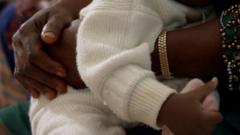Chioma confidently holds her baby, Hope, declaring him her miracle after years of trying to conceive. However, the legitimacy of her claims is under scrutiny by family members and local authorities. After enduring eight years of pressure from her husband Ike's family to conceive, Chioma sought help at a dubious clinic offering a bizarre "treatment" for infertility that led her down a path of deception and potential human trafficking.
In Anambra state, officials are grappling with a rising trend of cryptic pregnancy scams, where women are manipulated into believing in false medical claims that guarantee pregnancy through mysterious means. The onset of these scams reflects Nigeria's high birth rates and the societal pressure on women to bear children, often leading them to vulnerable choices.
As detailed in an extensive BBC investigation, women are subjected to costly treatments under the guise of miraculous fertility solutions, which may include injections or substances that lead to misleading bodily changes. Claiming these measures induce so-called pregnancies, the scammers then prepare women for a fabricated birth process, charging escalating fees for dubious drugs necessary for the "delivery."
This scam persists despite its grounded absurdities—like the insistence that no medical scans would reveal the phantom pregnancy. Those who "deliver" often awaken traumatized with scar-like marks, holding newborns they were led to believe they birthed. Undercover reporters exposed one such facility where a woman posing as "Dr. Ruth" celebrated with patients receiving sham pregnancy confirmations.
The scheme also taps into a network of disinformation on social media, where terms like "miracle" and "cryptic pregnancy" circulate among communities seeking answers to infertility. Features of these programs extend beyond Nigeria, drawing in women from various backgrounds often at their most vulnerable.
Authorities, like Ify Obinabo, the state commissioner for women affairs, are working tirelessly to dismantle these operations. Recent raids on suspected clinics have revealed horrifying realities, including young women being coerced into giving up their newborns for financial gain, feeding into an unsettling cycle of exploitation.
As Chioma's case unfolds, officials express deep concern over the societal perceptions of female fertility, with threats to take baby Hope from her hanging in the air. Ultimately, the persistence of such scams illustrates a dire need for change in the understanding and treatment of reproductive rights and the adoption process in Nigeria. The cycle of desperation and deceit continues unless systemic changes, community education, and compassionate support systems emerge.




















